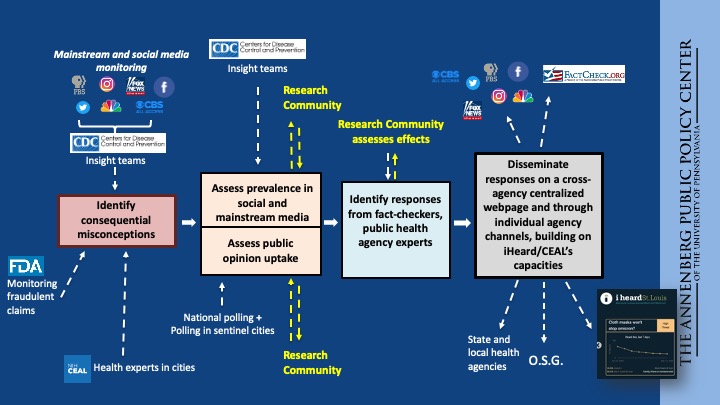The Annenberg Public Policy Center (APPC), with support from the Robert Wood Johnson Foundation (RWJF), will expand a new public health media model for blunting the impact of deceptive claims about health by using a preemptive, protective approach that aims to minimize the public’s susceptibility to them.
The 18-month, $1.2 million grant enables APPC and its partner, Critica, a nonprofit organization seeking to center the role of science in making rational health decisions, to expand their model for a nationwide health knowledge assessment and response system beyond Covid-19 deceptions to other consequential knowledge about topics that include vaccination and maternal and reproductive health.
Under a previous RWJF grant, APPC and Critica developed a reliable way to track Covid-19 deceptions and organize them under a taxonomy that identifies recurrent patterns of deception about infectious diseases and ways to minimize susceptibility to them. APPC researchers reliably fit more than 4,000 Covid-related deceptions into one of seven categories – one of them, for example, being the origins of the virus.
After identifying prevalent ones, APPC’s FactCheck.org responds in Spanish and English through SciCheck, its science-focused fact-checking initiative. FactCheck.org publishes these corrective pieces on its website and disseminates them to news organizations and fact-checking websites. In addition, Critica’s “infodemiologists” correct them online in dialogues with commenters.
“Because deceptions fall into recognizable patterns, the scholarly community can identify and the public health community preemptively deploy knowledge that minimizes susceptibility to it,” said APPC Director Kathleen Hall Jamieson, the cofounder of FactCheck.org.
Under the model, journalists and fact-checkers can preempt or “pre-bunk” deceptions before they occur, while also “gistifying” corrective messages, simplifying them into short, memorable representations that capture the bottom-line meaning.
The grant project focuses on ways to create or improve existing structures that disseminate protective knowledge and corrective information. As part of the earlier grant, for example, Jamieson presented the following model for federal government reform to a meeting of the President’s Council of Advisors on Science and Technology (PCAST). Read more about this presentation.

Like its predecessor, this grant is focused in particular on increasing communication about consequential health behaviors within disadvantaged communities that have been more affected by these health issues. For much of the pandemic, Black and Hispanic individuals were less likely to be vaccinated than white individuals, though by one measure the likelihood that a Hispanic individual is vaccinated now exceeds the likelihood of vaccination for a white individual. The Black community also faces greater infection and negative health outcomes in the areas of maternal and reproductive health.
APPC’s work has been reported in scholarly journals and presented to government health agencies, notably in a keynote address Jamieson delivered in October 2021 at the Centers for Disease Control and Prevention’s Charles C. Shepard Science Awards Ceremony and in the March 2024 presentation to PCAST. The work has also been presented at convenings of the National Academies of Sciences, Engineering and Medicine and at major medical conventions and conferences.
As part of the first RWJF grant, FactCheck.org translated its Covid-related work into Spanish and developed partnerships to disseminate protective knowledge and corrections through Univision, MSN Latino, and regional news publications affiliated with networks of Hispanic and Black news publishers.
The APPC team is led by its director, Kathleen Hall Jamieson, Ph.D., and Patrick E. Jamieson, Ph.D., director of the policy center’s Annenberg Health and Risk Communication Institute. The Critica team is led by its chief medical officer, David Scales, M.D., Ph.D., and its president and chair, Jack Gorman, M.D.
Read more about this work:
- Conspiratorial thinking as a precursor to opposition to COVID-19 vaccination in the US: a multi-year study from 2018-2021 (Scientific Reports)
- Misinformation about vaccine safety and update of COVID-19 vaccines among adults and 5-11-year-olds in the United States (Vaccine)
- The role of non–COVID-specific and COVID-specific factors in predicting a shift in willingness to vaccinate: A panel study (Proceedings of the National Academy of Sciences)
- Marshaling the gist of and gists in messages to protect science and counter misinformation (Journal of Applied Research in Memory and Cognition)
- How conspiracists exploited COVID-19 science (Nature Human Behaviour)
- Conspiratorial thinking, selective exposure to conservative media, and response to COVID-19 in the US (Social Science & Medicine)
- The Covid-19 Infodemic – Applying the Epidemiologic Model to Counter Misinformation (New England Journal of Medicine)
- Patterns of media use, strength of belief in COVID-19 conspiracy theories, and the prevention of COVID-19 from March to July 2020 in the United States: Survey study (Journal of Medical Internet Research)
- How to debunk misinformation about COVID, vaccines and masks (Scientific American)

